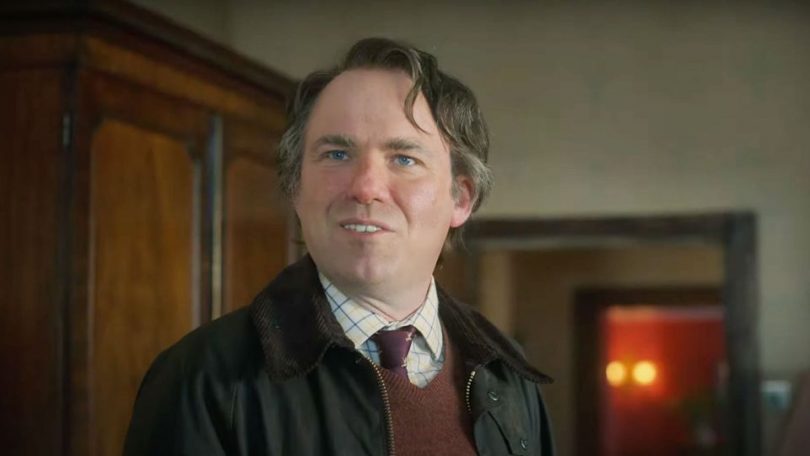Ah yes, toxic masculinity. The two words roll off the tongue like “corporate greed” and “mashed potatoes.”
“Men” (R, 100 minutes, in theaters), the new horror film from writer-director Alex Garland, is all about toxic masculinity. Jessie Buckley plays Harper, whose husband, James (Paapa Essiedu), jumps to his death after she makes it clear she’s going to divorce him. Harper heads for the English countryside for some alone time, but her “man troubles” continue in one nightmarish way after another.
Rory Kinnear (“Penny Dreadful”) plays the men she encounters – eight of them. Among them are Geoff, the weird local gent who rents her the quaint home at which she’s staying, and an especially creepy vicar. He also plays the chilling mythological figure the Green Man. Reading up on the Green Man in advance might help as you try to make sense of this bizarre film, which could have been named “WTF.”
There’s a lot to digest. You know this movie is going to be heavy on the metaphor early on when Harper pulls an apple from a tree and (speaking of digestion) chomps on it. Her encounters with Kinnear’s characters – and husband James – clearly are meant to reflect how men regard women, what their expectations/demands of women are, and the threats men pose to women.
The parts don’t come together as a whole in the same satisfying way Garland’s 2015 sci-fi thriller “Ex Machina” does. The over-the-top surrealism toward the end spins out of control, and while the shocking men-beget-men symbolism is accessible enough – Point made! – ultimately the story seems incomplete.
The parts, though, deserve mention. Buckley – a recent Oscar nominee for “The Lost Daughter” – is great as always (check her out in 2018’s “Wild Rose” if you haven’t already), and Kinnear’s juggling of multiple roles is a tour de force.
The initial meeting between Harper and Geoff is so painfully awkward it’s quite funny (intentionally, I’m sure), while Harper’s encounter with the vicar, who, as they sit side-by-side on a bench, places a hand on her knee while offering her his idea of moral support, captures a kind of oppression women must face regularly.
The most powerful scene involves the confrontation early in the film between Harper and James in which they argue about the divorce. James is adamant that she can’t do this, that he’ll kill himself. Harper remains resolved to follow through with her plans, despite his emotional blackmail.
You can feel the pain on both sides, regardless of what’s fair and what isn’t. At the same time, though, you can see how James is exhibiting what sociologist Michael Kimmel has termed “aggrieved entitlement” by blaming Harper in advance for whatever comes next because of his disappointment.
Finally, there’s this: “Men” sticks with you. You keep thinking about details in the film, what they might mean. You’ve got to give a movie credit for that.
Overall, I was disappointed with”Men.” But it’s worth seeing, anyway. **½ (out of four)
** Click here for Tim Miller’s previous movie columns for Cape Cod Wave **
Please like Cape Cod Wave on Facebook.
Cape Cod Wave Magazine covers the character & culture of Cape Cod. Please see our Longform stories.

Play It Again, Tim
Tim Miller is a Cape-based member of the Boston Society of Film Critics. He also teaches film and journalism at Cape Cod Community College in West Barnstable. You can contact Tim at [email protected] or follow him onTwitter @TimMillerCritic. Or you can ignore him completely.
































